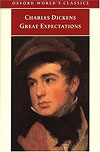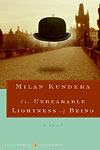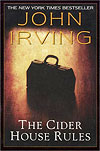
Great Expectations
By Charles Dickens
This book meant a lot to me when I first read it at 14, and it was the beginning of my love for Dickens. The characters are so well drawn: The convict is hideous; with Dickens's description, you can almost smell him. To me, Estella is a girl who's kept under glass. We're all products of our upbringing, and hers was certainly oppressive, but I could never forgive how selfish she was. I recently reread the book with my daughter, and this time around I realized that the one thing you can't be with someone you love is selfish.
By Charles Dickens
This book meant a lot to me when I first read it at 14, and it was the beginning of my love for Dickens. The characters are so well drawn: The convict is hideous; with Dickens's description, you can almost smell him. To me, Estella is a girl who's kept under glass. We're all products of our upbringing, and hers was certainly oppressive, but I could never forgive how selfish she was. I recently reread the book with my daughter, and this time around I realized that the one thing you can't be with someone you love is selfish.

Personal Velocity
By Rebecca Miller
These short stories are mostly about women at crossroads, about the ways each one chooses to move forward. Rebecca Miller herself turned the book into a film, and I played one of the characters, Delia, who leads with her sexuality. She's a woman with very few options and a husband who beats her. Then she takes her kids away from him, and you see her slowly get her power back. I never get the trampy girl role; I'm so grateful that Rebecca wrote this character and gave so many intimate details in the story of who Delia was, and then asked me to play her.
By Rebecca Miller
These short stories are mostly about women at crossroads, about the ways each one chooses to move forward. Rebecca Miller herself turned the book into a film, and I played one of the characters, Delia, who leads with her sexuality. She's a woman with very few options and a husband who beats her. Then she takes her kids away from him, and you see her slowly get her power back. I never get the trampy girl role; I'm so grateful that Rebecca wrote this character and gave so many intimate details in the story of who Delia was, and then asked me to play her.

The Unbearable Lightness of Being
By Milan Kundera
This is an incredible study of relationships: how they start and how they sustain themselves—or fail to. It's one of the truest things I've ever read about love and sex. The story, set in Czechoslovakia during the 1968 revolution, follows Tomas, who can't seem to engage in what's happening. Instead, he becomes involved with a number of women—while married to Tereza. Through Tomas and Tereza's relationship, Kundera shows how linked love and suffering are.
By Milan Kundera
This is an incredible study of relationships: how they start and how they sustain themselves—or fail to. It's one of the truest things I've ever read about love and sex. The story, set in Czechoslovakia during the 1968 revolution, follows Tomas, who can't seem to engage in what's happening. Instead, he becomes involved with a number of women—while married to Tereza. Through Tomas and Tereza's relationship, Kundera shows how linked love and suffering are.

The Cider House Rules
By John Irving
This novel is about a boy named Homer who grows up in an orphanage in Maine—and how he leaves it for the larger world. But I was more fascinated by the character of Dr. Larch, the director of the orphanage. He's so dedicated to these kids—you think he's a saint—but then you discover he's an addict. And this discovery presents the idea that no one is perfect, and a person can still be good and noble despite his faults. His addiction humanized him.
By John Irving
This novel is about a boy named Homer who grows up in an orphanage in Maine—and how he leaves it for the larger world. But I was more fascinated by the character of Dr. Larch, the director of the orphanage. He's so dedicated to these kids—you think he's a saint—but then you discover he's an addict. And this discovery presents the idea that no one is perfect, and a person can still be good and noble despite his faults. His addiction humanized him.

Nine Stories
By J.D. Salinger
I love short stories because you get to know the characters in them really fast and really intimately. It's like riding the subway—you've got just a moment with these people, but you see a little bit of their lives. Seven of the stories in this collection were first published in The New Yorker. Though very different in their plots, they share an underlying subject: love. My favorite is "The Laughing Man." Salinger does an amazing job of building a children's story within a story of an adult's heartache.
By J.D. Salinger
I love short stories because you get to know the characters in them really fast and really intimately. It's like riding the subway—you've got just a moment with these people, but you see a little bit of their lives. Seven of the stories in this collection were first published in The New Yorker. Though very different in their plots, they share an underlying subject: love. My favorite is "The Laughing Man." Salinger does an amazing job of building a children's story within a story of an adult's heartache.




